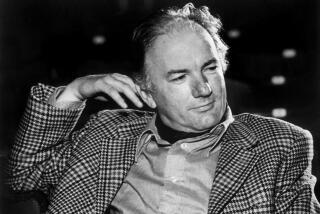Book review: ‘My Prizes: An Accounting’ by Thomas Bernhard
“Love moves me to speak,” Beatrice tells Dante as she leads him through Paradise. Loathing moved the late Austrian novelist Thomas Bernhard to write. He wrote with unfailing vitriolic scorn and run-on paragraphs of unalleviated length, designed, seemingly, to punish the reader along with his subjects. Yet it is an energized, kinetic loathing.
Bernhard’s harsh wartime childhood, forcible membership in a Nazi youth group, a stay in a tuberculosis sanatorium and disgust with the blinkered narrowness of postwar Austrian society were a darkness upon darkness that caused him to despise any use of art’s light to depict it, as Kafka and Robert Musil did. Instead, in such novels as “Woodcutters” and “Gargoyles” and a memoir, “Gathering Evidence,” Bernhard devised a lantern that shines black.
Now comes a decidedly odd collection, “My Prizes: An Accounting,” a deliberate, sardonic absurdity. Written in 1980 but appearing 20 years after his death, the book gathers brief recollections of nine literary prizes Bernhard won. Simultaneously furious and comical, it skewers the pomposity and vanity of such prizes, of those who give them, and those who receive them. Nor does he spare himself. And there is something else: a note here and there of pleasure, even tenderness.
Just the names of some of the prizes declare the absurd. The Prize of the Cultural Circle of the Federal Association of German Industry? The Literary Prize of the Federal Chamber of Commerce?
He makes a mock ceremony of rising to the occasion. Invariably attired in an old red sweater and corduroys, he shops for an expensive “anthracite-colored” suit to attend the awards. He could be buying a silly disguise for a costume party. But he erupts in fury when nobody meets him at the entrance to a celebration of the Grillparzer Prize, and he seats himself far back and refuses to come to the front until the presiding official personally seeks him out. He mocks the prize and the mediocre cultural figures who bestow it; he accepts only because he needs the money. Afterward he finds the new suit is too constricting, in fact as well as symbolically, and he returns it for a larger one. Will the purchaser of the returned suit, he wonders, know that it has won the Grillparzer Prize?
Bernhard writes of getting the news of the German Industry prize during a stay in “a lung hospital” for his tuberculosis. His account has him at his mordant best. All the patients in his ward died except for him and a Catholic theology student whom he argued out of his faith. Another patient, a policeman, came every day to play a game called Pontoon. “For weeks he won and I lost until he died and I didn’t.” The hospital itself he describes as miserable and squalid, displaying “meanness, hysteria and self-sacrifice in equal measure.” An eminent surgeon came regularly to operate, so that “increasing numbers of patients had ever-decreasing numbers of thoraxes and larynxes.”
The only-in-it-for-the-money theme is also repeated. Yet when he tells us what the money is for, he shifts unexpectedly away from cynicism. Once, it is to repay a debt to his aunt, whom he loves. She accompanies him to the ceremonies, takes him on vacations and gives him prudent advice. The prudence extends to advising him to refuse a prize he feels demeans him; Bernhard delicately portrays common sense in the service of an uncommon sensibility.
Other prize money goes to buying and gradually rebuilding a decrepit farmhouse in which he finds a much-needed refuge. A third is used for fun: he buys a white roadster with red seats and takes his aunt on trips, one to Yugoslavia where a Croatian driver smashes into him. He hires a pricey lawyer; to his surprise the man recovers not only the car’s full value — Bernhard immediately buys a replacement — but also the imaginary cost of the expensive clothes that he was not wearing.
Pleasure has infiltrated; so does sentiment into Bernhard’s mood. Besides writing of his aunt, he describes the Julius Campe Prize, honoring the publisher of Heinrich Heine, who was a target of Nazi anti-Semitism. Bernhard likes everything about the ceremony, including the speeches and that it was held in Hamburg, one of the few cities he admits to loving. And the roadster money, of course.
Yet for another, different prize, because it is in honor of one of the loyal friends of his beloved grandfather, Bernhard gives the money to an organization that helps prisoners. And he recalls with indulgent tenderness, another friend of his grandfather, an obscure novelist and bore who talked for hours about novelistic theory, managed to redeem himself, in Bernhard’s eyes, with this advice: Never buy shoes before 4 in the afternoon; that way they have time to expand into natural foot shape.
Eder, a former Times book critic, was awarded a Pulitzer Prize for criticism in 1987.
More to Read
Sign up for our Book Club newsletter
Get the latest news, events and more from the Los Angeles Times Book Club, and help us get L.A. reading and talking.
You may occasionally receive promotional content from the Los Angeles Times.








